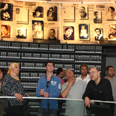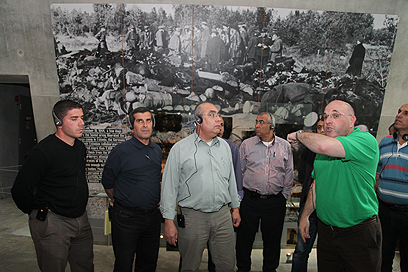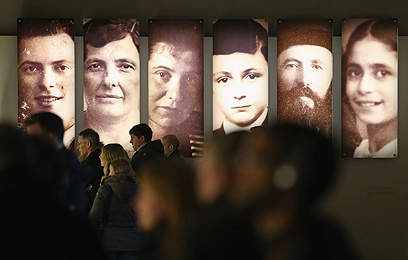
Arab terachers visit Yad Vashem
צילום: איציק הררי
Arab teachers: Kids compare Shoah to current conflict
Yad VaShem offers Holocaust teaching seminars for Arab teachers; 'It is not simple teaching Arab students about the shoah,' it says
"A year ago I visited Yad VaShem for the first time and I was in shock. Despite the geographical proximity, Arabs and Jews are quite far from one another. We don't really know each other or know much about each other's culture. I think that Arab students should visit Yad Vashem once a year."
If these words would have been spoken by a Jewish school-teacher nobody would have taken notice, however they were spoken on Sunday, at Yad Vashem by Hanan Mahamid, a history teacher from Umm al-Fahm, and thus they gained a new and potent meaning.
Related Stories
- Op-ed: Europe losing its memory
- UK footballers promote Shoah education
- Indians exposed to Holocaust studies
This is the third year in a row that Mahamid is taking part in a teacher's seminar being offered by Yad VaShem's International School for Holocaust Studies.
As part of the unique project, teachers from the world-renown Holocaust Museum make their way from Jerusalem to different Arab communities like Shfaram, Baqa al-Gharbiyye, Tel Sheva and Taybeh, and give Arab teachers seminars on how to teach the history and events leading up to the Holocaust to their students.
The seminar involves 30 hours of instruction over a three-month period, and since last year, the seminar culminates in a visit to Yad Vashem on Mount Herzl in Jerusalem, a first for most of the teachers.
Until know, the teachers have refused to speak about the project because of the sensitivity surrounding the issue.
However, they now agreed to recant the empowering experience, tell of the tough questions posed by their students and even boast about the rise in grades they have seen since they began taking part in the program.

Arab teachers during a visit (Photo: Itzik Harari)
"I decided to take part in this teacher's seminar because I thought that the younger generation needs to know and learn what happened there," Mahamid said.
"The Jew people have also been through much pain and suffering. As a teacher I feel a responsibility to teach them about this subject. It has nothing to do with national identity, but rather with human beings living together and mutually learning about one another."
As part of the seminar the teachers are exposed to films about the holocaust as well as survivor testimonies. Until the seminar, Mahamid would teach the material in a dull and test-oriented manner, but like her opinions on the subject, she says her ways have changed.
"I discovered many things that I was unaware of. I was never exposed to testimonies and the experiences of real people who where there. All these are proof that the Shoah took place and that there is no room to deny it."

Testimonies leave 'no room to deny' (Photo: Gettyimages)
Nonetheless, Arab teachers teaching the subject as part of the high-school matriculation exams, testify that it is common for students to compare between the holocaust and the Israeli-Palestinian conflict.
"I try to explain that it is in no way the same thing," Mahamid says. "I tell them that it was not a regular war, but a tragedy that cannot and should not repeat itself - they understand."
No politics
Yusuf Hasan, a teacher from Kfar Mashhad in northern Israel, is reminded of his first visit at Yad Vashem, where he recalls feeling of both strength and pain.
He too explains that taking part in the seminar has greatly helped his teaching: "It is not simple explaining to Arab kids the Jewish shoah.
"We screen movies and play testimonies, when you hear it from someone who was there at the time it is as if you are experiencing it with them. It is somehow relieving for us to tell them what happened there."
Rahsa Hussein, a teacher in the Arab town of Fureidis, took part in the seminar and will begin teaching the subject in her class this year. In the upcoming months she is scheduled for her first visit to Yad Vashem.
"I'm anxious," she said in regards to the visit. "I am interested in finding out about the place and what it has to offer my classes. I think it will enable me to teach the subject of the holocaust in a more diverse and rich manner, and less like a robot reading from a text book."
Sharit Hoch-Markovitch, head of the International School for Holocaust Studies' Pedagogic and Resource Center at Yad Vashem, tells of the dilemma she faced regarding whether to open the program or not.
"It is not easy for the teachers to come here; we must understand that some of them did not know a single thing about Yad Vashem.
"On the other hand, it is also a first for our teachers coming to their towns and villages. Despite the fact that there will always be tension, our apprehensions seemed to have disappeared.
"The direct interaction is special for both sides, because it immediately makes any stereotypes we might have disappear. We don't talk politics; rather we deal with the teaching materials."
- Receive Ynetnews updates directly to your desktop










